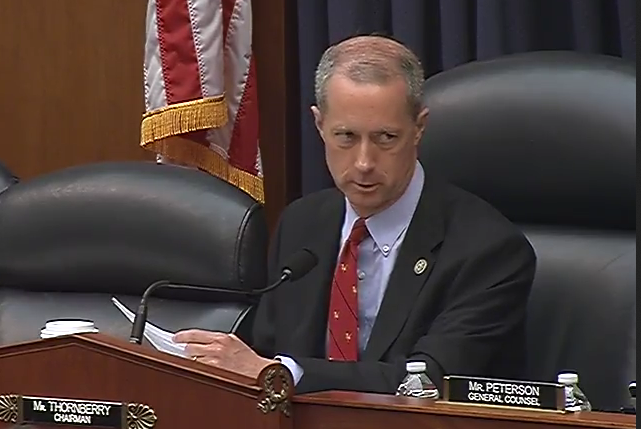
House Armed Services Committee Chairman Rep. Mac Thornberry (R-Texas) presides over the committee's markup of defense authorization legislation earlier this year. Screenshot photo.
House and Senate conferees Monday agreed to common defense authorization legislation language for Fiscal 2019, clearing the way for final congressional action on the legislation, which is likely to begin with a House vote this week.
According to a Senate Armed Services Committee summary, the bill would authorize a base defense budget of $639 billion for the Pentagon and national security programs in the Energy Department, as well as $69 billion for Overseas Contingency Operations. Defense-related activities outside NDAA jurisdiction of $8.2 billion bring total funding levels to $716.3 billion.
The bill would authorize an increase of more than $300 million above the Trump administration’s request for science, technology, and testing, adding $150 million for hypersonics, $110 million for space constellation efforts, and $40 million for directed energy.
It would authorize $7.6 billion for 77 F-35 Joint Strike Fighter aircraft; $2.4 billion for 15 KC-46 aircraft; bar retirement of USAF JSTARS aircraft while increasing funding for its planned replacement, the Advanced Battle Management System; authorize $300 million for Air Force light attack aircraft and related long-lead material; $144.2 million for the A-10 Wing Replacement Program—$65 million more than the Trump administration request; and fully fund development of the B-21 bomber. It also would authorize $699.9 million for research and development on the long-range standoff weapon, $85 million over the administration request, and $414 million for the ground-based strategic deterrent, $69 million over the administration request.
According to a House Armed Services Committee summary, the bill also contains a number of space-related provisions, including language to establish a US Space Command under the US Strategic Command. This proposal came out of the House Armed Services Subcommittee on Strategic Forces markup of the bill in April and the full committee headed off an attempt to weaken the proposal during its own markup of the bill in May. A committee Democrats’ summary of the new bill says it drops the House proposal to direct the establishment of a new numbered Air Force for space warfighting.
The new proposal would also direct the Defense Department to develop a plan for a separate process for space-related acquisitions, direct the Secretary of the Air Force to develop a plan to improve the quality of the Air Force’s space cadre, and direct Defense to develop a space warfighting policy and plan identifying key tasks for space as a military domain.
